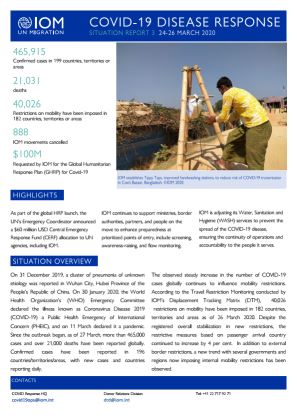-
Countries
-
Data and Analysis
-
Special Focus
-
Crisis Responses
Covid 19 Disease Response - Situation Report 3 ( 24-26 March 2020)

Contacter
COVID Response HQ covid19ops@iom.int
Langue
English
Emplacement
Global
Période couverte
Mar 24 2020
Mar 26 2020
Activité
- Other
On 31 December 2019, a cluster of pneumonia of unknown etiology was reported in Wuhan City, Hubei Province of the People’s Republic of China. On 30 January 2020, the World Health Organization’s (WHO) Emergency Committee declared the illness known as Coronavirus Disease 2019 (COVID-19) a Public Health Emergency of International Concern (PHEIC), and on 11 March declared it a pandemic. Since the outbreak began, as of 27 March, more than 465,000 cases and over 21,000 deaths have been reported globally. Confirmed cases have been reported in 196 countries/territories/areas, with new cases and countries reporting daily. The observed steady increase in the number of COVID-19 cases globally continues to influence mobility restrictions. According to the Travel Restriction Monitoring conducted by IOM’s Displacement Tracking Matrix (DTM), 40,026 restrictions on mobility have been imposed in 182 countries, territories and areas as of 26 March 2020. Despite the registered overall stabilization in new restrictions, the restrictive measures based on passenger arrival country continued to increase by 4 per cent. In addition to external border restrictions, a new trend with several governments and regions now imposing internal mobility restrictions has been observed.
IOM is the lead agency for Pillar: Points of Entry as part of the Regional Partners Coordination Platform for Preparedness and Response to COVID-19 for East, Horn and Southern Africa as well as for West and Central Africa (chaired by WHO). IOM is closely engaged with the broader United Nations system on how to include migrants and migration in the COVID-19 response. For example, IOM participated in and contributed to the extraordinary meeting of the UN Network on Migration Executive Committee on 25 March to assess the way in which the Network needs to adjust its work, including the way it works, in light of the COVID-19 crisis, and to develop a plan of action, in line with the Network Terms of Reference. As a global cluster co-lead for the Camp Coordination and Camp Management (CCCM), IOM is working with its counterparts and chair of the global working groups to plan and prepare for a series of webinars that will aim at providing support to field colleagues on adapting and adjust their programming in preparedness for reducing risks of COVID-19 in displacement locations. The first of the webinars will be on the 2 April and will look at camp management standards and the application of such standards in the context of COVID19. Subsequent webinars (planned for every Tuesday) will cover topics on community engagement and risk communication, capacity development, and remote management. IOM is in the process of developing a global approach to mobilizing financial, professional and human resources available in the global diaspora and transnational communities to help strained communities and health systems cope with the challenges related to the COVID 19 outbreak. Specifically, IOM will mobilize medical professionals among diaspora to volunteer and temporally return to their home communities to support with the crisis response. Further, the already existing channels of collaboration on IDiaspora.org will be reinforced to enable crowdfunding and a donation function, to ensure that additional financial support and resources can be channeled consistently and in a trusted manner to those in most need.
